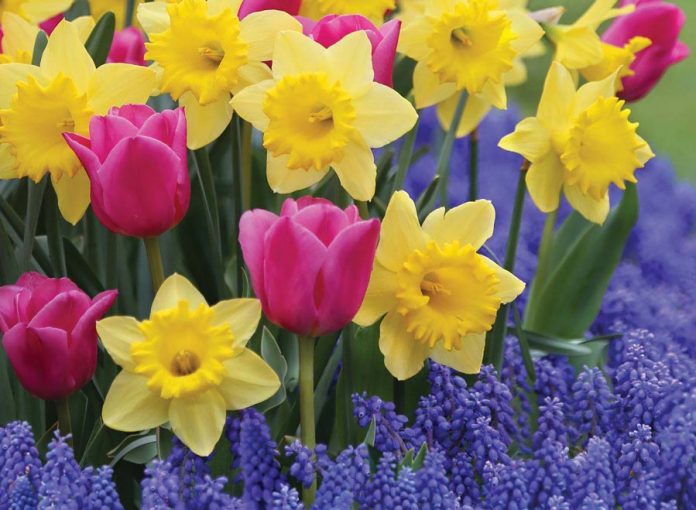
by Melinda Myers
Shorten the winter season with the help of spring flowering bulbs that you plant in fall. These beauties often provide the first bit of color, fragrance and winter relief each year.
Look for new and unique ways to incorporate bulbs into your landscape. Create a seasonal water feature with a river of blue scillas and grape hyacinths meandering through the garden. Welcome visitors with a front door or walkway garden that blooms from early spring through early summer and is loaded with crocus, tulips, daffodils and allium.
Don’t overlook those shady spots. Many of these locations provide enough early season sun, before the trees leaf out, for bulbs to grow and flower. Use more shade tolerant spring bloomers like snowdrops, grape hyacinths, scillas, anemones, daffodils, fritillarias and Camassias in shady areas among hostas, ferns and other shade tolerant perennials.
Whether you’re new or experienced, growing bulbs is an easy endeavor. Just follow these simple steps to a beautiful spring garden.
Selection
Purchase bulbs that are dense and firm, and free of bruises or mold. Shop early for the best selection. Mail order sources will ship your bulbs at the proper planting time. If you buy locally, store the bulbs in a dry, well-ventilated and cool 60-degree location until it’s time to plant.
Don’t let deer, rabbits and chipmunks dissuade you from planting. Include hyacinths, grape hyacinths, scillas, glory-of-the-snow, fritillarias, alliums and Camassias that the animals tend to overlook.
Design Ideas
Include a variety of bulbs for added color throughout spring. Early bloomers like Glory of the Snow, crocus, early tulips and daffodils, and grape hyacinths (Muscari) are followed by mid-season daffodils and tulips along with fritillarias. Late spring blooming tulips and alliums finish off the spring display.
Combine several bulbs that bloom at the same time to double the floral impact or at different times to extend the color throughout the spring. You can create your own combinations or look for prepackaged combinations prepared by experts like those at Longfield Gardens (Longfield-Gardens.com). Low growing White Splendor anemone along with Ocean Magic grape hyacinth make a striking combination for under shrubs. The yellow blossoms of Dutch Master daffodils, pink Involve tulips and purplish blue grape hyacinths will give you several layers of color in the garden.
Or add a bit of eye-catching red to the garden throughout the spring with the Really Red collection of tulips. Red Emperor starts things out in early spring, followed by Oxford and ends with double-flowering Red Princess and Sky High Scarlet.
Location
Plant bulbs in well-drained soil for best results. Avoid areas such as next to the dryer vent or against the south side foundation of your home that tend to warm up early in spring or experience a winter thaw. These bulbs often sprout too early and subsequent cold temperatures can limit or eliminate their bloom.
Reduce maintenance and boost your garden’s beauty by mixing bulbs with perennials. Once the bulbs are done blooming, the neighboring perennials mask the fading bulb foliage.
When and How to Plant
Increase growing success in poor soils by incorporating several inches of compost, peat moss or other organic matter into the top 12” of soil. This improves drainage in clay soil and the water-holding ability of sandy and rocky soils. Then be sure to incorporate a low nitrogen, slow release fertilizer.
Wait to plant your bulbs until the soil cools. This is any time after the night temperatures are consistently 40 to 50 degrees, but several weeks before the ground freezes.
Plant spring blooming bulbs three times as deep as the bulb is tall. Water thoroughly to remove air pockets and encourage fall root growth. Add a layer of mulch to conserve moisture, suppress weeds and reduce the risk of early sprouting.
So break out your trowel and garden gloves and get busy planting. You’ll be glad you did when spring arrives and your yard and garden are filled with a rainbow of beautiful flowers.
Melinda Myers has over 30 years of gardening experience and has written over 20 gardening books, including Small Space Gardening. She hosts The Great Courses “How to Grow Anything: Food Gardening For Everyone” DVD set and the nationally syndicated Melinda’s Garden Moment TV & radio program. Myers is a columnist and contributing editor for Birds & Blooms magazine and was commissioned by Longfield Gardens for her expertise to write this article.





















